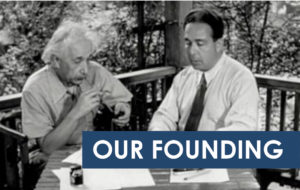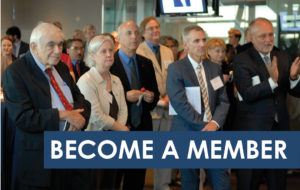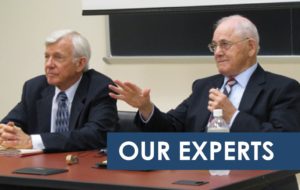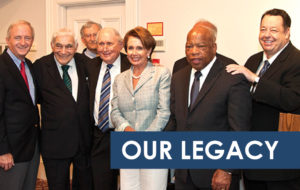The Council for a Livable World promotes policies to reduce and eventually eliminate nuclear weapons, and to minimize the risk of war through lobbying and by helping elect and support Members of Congress who share our goals. For more than 60 years, the Council for a Livable World has been advocating for a more principled approach to U.S. national security and foreign policy.
Founding
 Manhattan Project nuclear physicist Leo Szilard founded Council for a Livable World in 1962 to deliver “the sweet voice of reason” about nuclear weapons to Congress, the White House, and the American public.
Manhattan Project nuclear physicist Leo Szilard founded Council for a Livable World in 1962 to deliver “the sweet voice of reason” about nuclear weapons to Congress, the White House, and the American public.
“The policies of the great powers have consistently followed the line of least resistance, and this line leads to an unlimited arms race. I do not believe that America can be made secure by keeping ahead in such an arms race,” Szilard declared in April 1962 as he toured the country building support for the Council.
Szilard fought for years to harness the power of atomic energy. In a letter prepared in 1939 for Albert Einstein, Szilard warned President Franklin Roosevelt about the possibility of atomic weaponry and urged the United States to develop these weapons before Nazi Germany could. This letter catalyzed the American government’s involvement in atomic research and led to the establishment of the Manhattan Project.
After unleashing the first controlled nuclear chain reaction and participating in the Manhattan Project, Szilard adamantly advocated against using the atomic bomb. Szilard drafted a petition to President Harry Truman in July 1945 opposing the use of the bomb on moral grounds and warned him of the dangers of using atomic weapons against Japan. While ultimately unsuccessful, those efforts led Szilard on a lifelong quest for a method to safeguard peace.
In his constant quest for a method to safeguard peace, Szilard made an important realization:
“I was led to conclude that the sweet voice of reason alone could not do the job, that campaign contributions could not do the job, but the combination of the sweet voice of reason and substantial campaign contributions might very well do the job.”
This insight was the seed that grew into the Council for a Livable World, which today upholds Szilard’s legacy by advocating on Capitol Hill for sound policies to reduce nuclear threats, and by endorsing and raising funds for Congressional candidates who support these goals. In the 2020 election cycle, we helped raise $1.5 million for progressive Congressional candidates nationwide.
Our efforts have been instrumental in achieving myriad nuclear policy achievements, and as of 2023, we have helped elect more than 400 Members of Congress.
Learn more about Szilard and the founding of CLW from former board member and Szilard biographer William Lanouette.
Members
 With more than 60,000 people nationwide subscribed to receive our emails or direct mails, our base of support is strong and continues to grow, even as national focus shifts away from nuclear weapons policy issues.
With more than 60,000 people nationwide subscribed to receive our emails or direct mails, our base of support is strong and continues to grow, even as national focus shifts away from nuclear weapons policy issues.
Members, who pay $5 annually to maintain their membership, can contribute to the Council’s Candidate Fund, a political action committee that the Council uses to help our endorsed candidates in tight races as elections near. Find out more about the Council for a Livable World Candidate Fund and how to join.
Board and Experts
 Over the past 50 years, many distinguished elected officials, artists, scientists, academics, military officers, authors, and activists have been affiliated with the Council for a Livable World.
Over the past 50 years, many distinguished elected officials, artists, scientists, academics, military officers, authors, and activists have been affiliated with the Council for a Livable World.
- Physicist Hans Bethe, who won the 1967 Nobel Prize in Physics for his work in solar and stellar energy, was a longtime board member. Upon his death in March 2005, the Council for a Livable World renamed its now-former building “The Hans Bethe Center.”
- Manhattan Project physical chemist George Kistiakowsky, a recipient of the Presidential Medal of Freedom and the Joseph Priestly Award of the American Chemical Society, became chairman of the Council for Livable World in 1977 and served in that position until he passed away in December 1982.
- Carl Sagan, who played a leading role in the American space program, and Jerome Wiesner, who held numerous government advisory positions on science and technology, were both active board members for many years.
- Father Robert F. Drinan, the first Roman Catholic priest to be elected to Congress, was a longtime board member and chair of Council for a Livable World’s PeacePAC. In 2006, the Council established the Father Robert F. Drinan National Peace and Human Rights Award to honor individuals who exemplify the late Father Drinan’s commitment to peace and human justice.
Today, our board members include former Members of Congress, diplomats, military officials and other experts on political engagement and nuclear weapons policy.
Legacy
 Since 1962, the Council for a Livable World has helped to elect 400 members of Congress who are supportive of principled national security and foreign policy positions, including arms control.
Since 1962, the Council for a Livable World has helped to elect 400 members of Congress who are supportive of principled national security and foreign policy positions, including arms control.
Council members and supporters provide more funds to candidates than any other peace and security organization. We raised $1.5 million for candidates in 2020 and hope to raise more than that in 2022.
Along with its sister organization, the Center for Arms Control and Non-Proliferation, Council for a Livable World has been at the forefront of U.S. arms control and national security policy for more than half a century.
We work directly with Congress to advocate for sensible national security policies and arms control. Some notable accomplishments include ratification of the New START treaty with Russia, establishing a U.S. nuclear testing moratorium, and supporting the Iran nuclear negotiations.
Center for Arms Control and Non-Proliferation
Our affiliated research and education organization is the Center for Arms Control and Non-Proliferation, a Washington, D.C.-based 501(c)(3) organization. It is a national nonpartisan nonprofit dedicated to enhancing peace and security through expert policy analysis and thought-provoking research. Since 1980, the Center’s expertise on reducing the threats of war and nuclear weapons has been sought by the media and policymakers — and supported by the tax-deductible contributions of foundations and individuals.
Together, the Council and the Center engage in hard-hitting, fact-based analysis and advocacy to fight for a more livable world.
